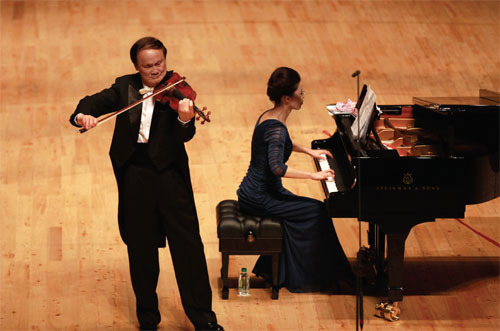Meteoric rise of the violin kings
Groundbreaking musician Pan Yinlin is helping to spread the word about classical and modern Chinese music through his concerts
People all over the world are becoming interested in listening to Chinese music and even playing modern Chinese compositions, observed violinist Pan Yinlin.
In the early 1980s, the 68-year-old virtuoso became the first Chinese musician to serve as a principal soloist in a foreign symphony.
On March 7 Pan gave a recital at Shanghai Symphony Hall, playing his repertoire of modern Chinese compositions, as well as his selection of classical pieces.
"The most familiar piece to international audiences is of course the Butterfly Lovers, the violin concerto by Chen Gang and He Zhanhao," Pan told the media before the concert.
Many of Chen's compositions have been well received overseas, Pan said, such as Morning of Miao Hills and Sunshine on Tashkurgan.
"Audiences can recognize the melodies from different ethnic groups, and they are able to relate to the scenes of the open prairie when I play such pastoral Chinese songs."
A recent concert in Germany featured one of Chen's compositions, with a German violinist playing The Golden Stove.
"People enjoyed it and said they didn't realize China had this kind of music," Pan said. "Before hearing my concerts, foreign audiences said they were only aware of Chinese acrobats and Peking opera."
Much of the established repertoire of Chinese composers dates back to the 1970s, when the cultural revolution (1966-1976) called an end to most artistic and intellectual endeavors, except for those that served the interests of propaganda.
Born in Shanghai, Pan started to play the violin at the age of 10. By the time he graduated from a middle school attached to the Shanghai Conservatory of Music, the conservatory had stopped recruiting, as the professors were sent to do farming work in the countryside for the purpose of re-education through hard labor.
Luckily for Pan, his talent was recognized and he joined the Shanghai Symphony right after middle school. He became the youngest principle soloist in the orchestra's history.
"We played a lot of revolutionary operas," Pan recalled. "You could not play foreign music in public. Chinese compositions had to be censored by the officials, too."
Wang Hongwen was one of the "gang of four", a quarter that reigned supreme through the cultural revolution. Wang was the top official in Shanghai at that time. His secretary would personally censor each piece of music before it was released.
Only after it had received official approval would a composition be broadcast on the radio.
A Ke Jian's adaptation of a popular revolutionary song, Blossom of a Thousand-Year-Old Iron Tree, was approved and Pan's performance was broadcast nationwide. The composer went on to create songs incorporating revolutionary themes with ethnic musical elements.
"Radio stations used to broadcast a whole collection of my songs," Pan recalled. He was soon famous all over the country.
Pan played down praise that he singlehandedly protected violin music through the period, when such "bourgeois" interests as high culture and literature were systematically targeted and destroyed.
But it is true that his success encouraged many people to take up the instrument.
"Many people were learning to play the violin at that time," he said.
A proficient violinist would gain opportunities to join the "propaganda team" and work as a professional musician, he added.
"It was a way to escape from farming and other forms of hard labor," Pan said.
Studying the violin was so popular in the latter years of the cultural revolution that "you could hardly buy the instrument," he recalled.
Chinese compositions from the 1970s still make up a significant part of his repertoire. More than 40 years have passed since those turbulent times and society has changed radically, "but good works of art endure the test of time," he said. These works are still young in comparison to masterpieces from the likes of Beethoven and Mozart.
"These compositions are still loved because the melodies came from popular tunes familiar to the people, and they were composed in a way that makes the music easily understood," Pan said.
He joined the Yomiuri Nippon Symphony Orchestra in 1981. In 1984 he became the first Chinese instrumentalist to rank among its principle soloists, according to the Japanese media.
Later, he went on to work with more international orchestras but he was forever grateful for the recognition he received in Japan.
"I am always ready to work to support the friendship between China and Japan," Pan said. "Whichever city we played in Japan, people were nice and treated me with the utmost respect. However the Sino-Japanese diplomatic situation develops, the level of friendship on a civilian level should be enhanced."
In the 1990s Pan moved to Australia. He played in several orchestras in Australia and Japan before returning to the Shanghai Symphony in 2003.
He finally left the symphony in 2012, saying he felt grateful for getting to spend half of his professional career there.
He played Chinese music in the first half of his concert at the new Shanghai Symphony Hall and classical pieces in the second half, with Bach Chaconne as the highlight. This challenging 16-minute solo piece gave Pan a chance to flash his virtuoso skill.
"Fortunately I learned the secret of playing it from maestro Lin Kechang," he said.
At the age of 68, Pan became a pupil of Lin, the most important violinist in modern Chinese music history. Both now live in Australia. During Pan's visits to Lin, the 87-year-old maestro shared the methods and techniques he learned in Paris from Romanian violinist George Enescu in the 1950s. Pan even inherited Lin's 300-year-old violin.
"I bought the instrument from my teacher. It adds greater resonance when I use it to play the songs he taught me," Pan said.
zhangkun@chinadaily.com.cn
|
Pan Yinlin, the first Chinese musician to join a foreign symphony as its leading soloist, recently performed at the new Shanghai Symphony Hall. Provided to China Daily |



















